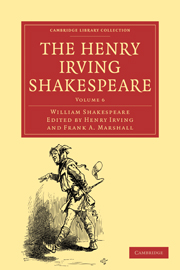3 - CORIOLANUS
Published online by Cambridge University Press: 29 August 2010
Summary
INTRODUCTION
LITERARY HISTORY
” The Tragedy of Coriolanus” first appeared in the Folio of 1623, where for some reason it was printed first of the tragedies. Afterwards Troilus and Cressida, which ought to have followed Romeo and Juliet, but had been omitted, it would seem by an accident, was placed in front of it. This is shown by the paging.
For the date of the play there is at present little external evidence. Malone pointed out a passage in Ben Jonson's Silent Woman, v. 1: “Well, Dauphine, you have lurched your friends of the better half of the garland,” as probably a reminiscence or caricature of the phrase in ii. 2. 105: “ He lurch'd all swords of the garland;” and as the expression has not been discovered elsewhere, it is not improbable that the passages are in some way related. If so, the plays would probably belong to the same year, and the date of the Silent Woman is 1609.
However this may be, the date 1609 is certainly that suggested by the internal evidence of the style. To begin with, the play belongs obviously to the later tragedies, which are tragedies of passion; its kinship is not with Julius Cœsar, but with Antony and Cleopatra; and further, the apparent disregard of style, the overcharged sentences, and hurry of the periods make it probable that it was one of the last of these. An attempt has been made to fix its place more exactly by the test of what are called “light” and “weak” endings.
- Type
- Chapter
- Information
- The Henry Irving Shakespeare , pp. 217 - 318Publisher: Cambridge University PressPrint publication year: 2009First published in: 1889

